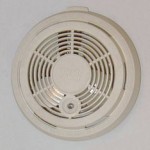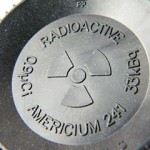Is it too hard to recycle smoke alarms?
 I had heard that smoke alarms should be replaced every 8-10 years, so I took a look at the alarms installed in my house. I found that many of them should have been replaced years ago, and decided to replace them all. This left me with eight old smoke detectors and a question: How can I dispose of them?
I had heard that smoke alarms should be replaced every 8-10 years, so I took a look at the alarms installed in my house. I found that many of them should have been replaced years ago, and decided to replace them all. This left me with eight old smoke detectors and a question: How can I dispose of them?
Smoke alarms are not accepted by our local recyclers, leading me to contact the manufacturer. After twenty minutes on hold, the rep asked for the exact model number of each one to look up the disposal requirements. Mine were not “required” to be recycled because they contain only a small amount of radioactive material. The rep indicated that the company would recycle the detectors, for $1 each, but that most people just throw them away.
 After boxing them up with my $8 check, I found that it would cost $13.58 to ship them back to the manufacturer. In all, I paid more than $21 to recycle eight smoke alarms, leaving me with one more question: How many people go through this time-consuming and expensive process, and how many people just send them to the landfill?
After boxing them up with my $8 check, I found that it would cost $13.58 to ship them back to the manufacturer. In all, I paid more than $21 to recycle eight smoke alarms, leaving me with one more question: How many people go through this time-consuming and expensive process, and how many people just send them to the landfill?
A little math shows that this is not a little problem: If alarms should be replaced every 10 years, then one in ten alarms should be replaced each year, on average. For the sake of an estimate, let’s say each house in San Carlos has 5 alarms. With about 11,000 houses in San Carlos, that’s 55,000 alarms in homes. In any year, replacing one-tenth of them would amount to 5,500 alarms. If those are sent back for recycling, that’s a lot of money. If they’re thrown in the garbage, that’s a lot of landfill space — possibly tainted by lead (from circuit boards) and radioactive material (from the detector, depending on the type of alarm).
I found only a few areas around the country trying to address the problem: New York (legislation to require free take-back by manufacturers) and El Paso (free handling through their household hazardous waste program). I don’t know if a program can be started in San Carlos, but it’s certainly galling to think of the thousands of smoke alarms — plastic and often lead, with a touch of radioactive material — flowing into the landfill year after year.
Cathrin Callas
References:
- Redwood City Fire Department smoke alarm program
- FEMA US Fire Administration Smoke alarms FAQ
- San Mateo County Household Hazardous Waste (smoke detectors not accepted)
- Proposed legislation in New York State
- El Paso smoke alarm recycling program
- San Carlos housing statistics

